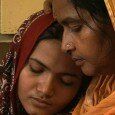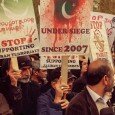By Sher Ali Khalti –
The honour killings of as many as 896 women in 2013 in Pakistan are not less than a joint FIR against the society and the state
The helpless girl was begging for mercy and repeatedly claiming her innocence. But nobody paid heed to her requests as she was dragged by none else than her own family members. “I do not have illicit relations with anyone. Please leave me, I’m your sister, I beg for my life. I am custodian of my tribe’s honour and have never even looked at a man outside my family. We are off-springs of the same mother. How can you be cruel to me? I never stepped out of the house without your permission. So how can I dare to cheat you? I am ready to take oath on the Quran to prove my innocence.” All these things that she said had no effect of the stern-faced men who seemed devoid of any emotions and acted in a mechanical manner.
An eyewitness Muhammad Altaf narrated later that he had gone to his neighbours’ house to save the life of this girl named Nosheen. Her two brothers and an uncle were furious and wanted to finish her there and then. “As I tried to say anything in her favour in a bid to save her life, a man came up to me and said: “Stay clear about it … she is a Kari (a girl who is destined to die for having illicit relations with someone). And shame on you. You are protecting a girl who has dishonoured the tribe by her immoral deeds. She asked for it. Get out of here or otherwise we will also kill you.”
The girl was charged with the crime of establishing illicit relations with one Qalandar Bukhsh. For her family, she was a burden on earth and they wanted to cleanse their house and the world of this impure creature. Qalandar Bukhsh disappeared the moment he came to know about this and has not returned yet.
Altaf also narrated the gory details of how it all went about and how Nosheen was treated during the last moments of her life. In his words, Amjad Ali – the real brother of Nosheen – shot her with a 32-bore pistol and the bullet hit her in the chest. She staggered and fell down. Another brother of her, Muhammad Arif, darted towards her with a sharp-edged knife and slit her throat. How could Allah Yar, the uncle of this 18 years old girl, stay behind and not participate in this customary effort to restore family’s honour. With an axe in his hands, he aimed at her and severed her limbs one by one. Her brothers also joined him in this act.
There was no remorse on their faces as they performed this task with a precision that only a professional woodcutter could claim. Within moments, there was blood everywhere and the girl’s body had changed into pieces of flesh. Though her mother was there, she did not say a word and stood like a lifeless statue. She was shattered from inside but she remained silent because it was a sin to have sympathy with a Kari.
After a while, they put these pieces in a sack, rode on a bike, travelled to a distance and threw the sack in the Indus River.
Altaf informed the concerned police station on Indus Highway where policemen namely Muhammad Afzal 1595/C, Waqas Abid 1669/C, Perviz Ahmed 1368/C and Waqas Ahmed 1693/C were present. An FIR was lodged under the sections 302/311, 201/34 of Pakistan Penal Code (PPC). Waqas Ahmed 1693/C was made the complainant under the instructions of Assistant Superintendent of Police (ASP) Rojhan Shabbir Ahmed Sethar as it was a crime against the state.
Shabbir says they are trying to control heinous crimes like murders in Karo Kari cases and stresses the need for more legislation is in this regard. He says the government has to play its role to protect the citizens and end human rights abuse in the name of tradition. He adds that local sardars (tribal elders) are a hindrance as they protect this tradition. In fact, the politics of waderas and sardars is based on these traditions and it flourishes due to such incidents and the role they play in the aftermath.
ASP says the police and the administration are playing their role but there is an urgent need to change the attitude of the society and take the elderly people on board. The old generation does not want to change the system as they think that they are the protectors of their system. The good news is that things are changing and the new generation is thinking positively.
Altaf is one such example as he challenged the status-quo and reported the incident to the police. His life was in danger for daring to speak out. He had to be very careful and took caution while moving around. He would have been attacked if he had been a witness in this case but fortunately for him the police had become the complainant.
A sociologist and lawyer Syed Nisar Safdar tells Pique that the society on the whole is responsible for the sorry state of affairs. When innocent people are killed and the society does not react, it means either the society is dead or it is giving sanction to these cruel acts. He says the concept of Karo Kari is inhuman and divides the human society on the basis of gender discrimination.
Karo Kari is a crime committed in the name of justice and the victims are generally innocent. Even if there is a case where a man and woman like each other, they receive maximum possible punishment for the offence of exercising freedom of choice, guaranteed by constitution of Pakistan of 1973.
Karo Kari, he says, demolishes the rule of law. It treats women as a subhuman. The mindset of those who execute killing orders is clear from the fact that they adopt the most inhuman methods to kill women. Sometimes they let ferocious dogs lose to tear women apart or cut human body into pieces. They are also burnt to ashes in front of people and the tormentors of this violence derive pleasure by putting them to agonized and torturous death.
District Rajan Pur is notorious due to high incidence of Karo Kari. The district has boundaries with all the provinces of the country and panchayts and jirgas are conducted here by sardars and waderas. They act according to local or tribal qanoon (law) which is called “Bahram Zai Kala Qanoon.” This law was introduced centuries ago and nobody is ready to accept that it violates human rights. This law is practiced in Sindh, South Punjab, KPK and Balochistan.
According to this law, in any panchayat or jirga held in the presence of a sardar, if a husband says his wife is Kari no one can challenge him. The allegation in itself is the verdict. A woman declared Kari would be killed on the spot or be sold in KPK or Baluchistan.
It has been observed that mostly women are slaughtered due to enmity. People declare their women Kari just to punish enemies, declared Karos, get land and money in compensation or get the women of opponents in marriage as a punishment to them. If a father says his daughter is Kari, he will also not be challenged. If a brother says his sister is Kari, sardar will ask him to present evidence of her sister’s illicit relations with a Karo man. If he proves, his sister will be killed or sold to people who are courtiers and sycophants of the sardar. They always appreciate the “wise” decisions of saradar. The Kari girl is never given the opportunity to defend herself.
There is one clarification here. A man and women do not have to be caught in objectionable position to be charged. Even a man and women standing close to each other or seen talking to each other can bring death sentence for them. Men can run away but woman cannot. The dead bodies of Karos and Karis are buried in a separate graveyard, there are no funeral ceremonies and nobody goes to the graves to pray for them.
Fauzia Viqar, Chairperson, Punjab Commission on the Status of Women says that as many as 869 cases of killing on the pretext of honour were reported in 2013 alone (Human Rights Commission of Pakistan Report). These figures are largely compiled from newspapers and do not reflect the actual numbers which go unreported.
She says: “Reasons for prevalent impunity are cultural practices preventing reporting, lack of prosecution, and loopholes in law and weak implementation of laws governing murder in the name of honour.” Qisas and Diyat law introduced in 1990 contributes to impunity by declaring murder a crime against the person rather than a crime against the State. The law encourages “honour killings” by granting a statutory right to the heirs of the deceased to pardon the killers or ask for compensation or demand retribution.
She suggests that to deal with the menace of Karo Kari, “amendments in the PPC shall be made. Murder in the name of “so called honour” shall be declared a crime against the State and a culpable homicide that is non-compoundable and non bail-able.’’
She says the Punjab government has established help desks in every division of Punjab to help women victims of violence. The victim can register their complaints by calling at free helpline – 0800-93374. The commission will help them out. A crisis centre has also been set up in Mianwali to help out women.
Asad Jamal, a lawyer with experience of contesting cases of human rights abuse, says the State is responsible for a crime committed against its citizens. It has to ensure that the criminal must be punished at any cost. He says according to Section 311 of PPC “Diyat and Qisas is accepted. In case of Karo Kari even if diyat and qisas are paid, the honourable judge must award imprisonment to the culprits at least for ten years.’’
He says the world has advanced and technology has revolutionized the lifestyles. “People are living in a global village. Male and female members are freely interacting with each other. So everyone cannot be killed on this pretext. Society, even the tribal, will have to change its behaviour and accept this change,” he added.
The writer is a journalist based in Lahore. He works for The News on Sunday
































































































